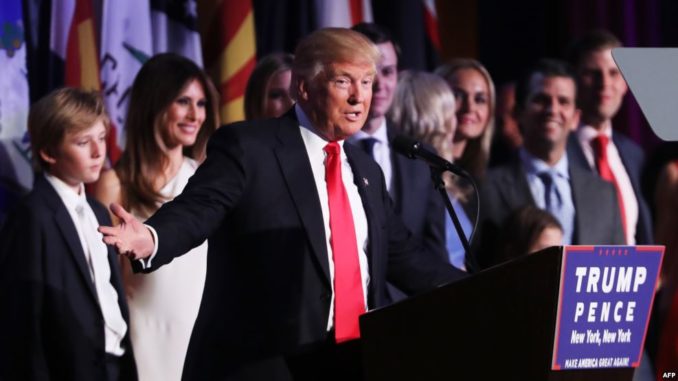
WASHINGTON —
Four years ago, Donald Trump declared that the U.S. Electoral College system of picking presidents “is a disaster for a democracy;” now he is headed to the White House because of it.
As the Republican president-elect late this week began assembling a cabinet and administration to take office in early January, he still trailed Democrat Hillary Clinton in the national vote by more than 233,000 votes, roughly 59.9 million to 59.7 million. Clinton’s edge could become even larger because votes are still being counted in states she won.
But in the Electoral College — the only count that matters in U.S. presidential elections – the blunt-spoken real estate mogul is ahead, 290 to 228 with the winner still to be determined in two states. The final result could favor Trump by as much as 306-232 edge.
Trump’s election as the country’s 45th president won’t change no matter how far ahead Clinton, a former U.S. secretary of state, might pull in the popular vote because of the Electoral College, the system the country’s founding fathers devised more than two centuries ago to elect presidents.
In essence, U.S. presidential elections are contested separately in each of the 50 states with the winner in each state getting all of that state’s Electoral College votes. Those, in turn, are apportioned roughly according to the population of each state, giving the most populous states a huge say in who becomes president.
California, for example, has 55 electoral votes, while seven small states and the national capital – which is not part of any state – have just three votes apiece.
With each state-by-state winner claiming all of its electoral votes, the difference between the Electoral College result and the popular vote can quickly become skewed, as occurred in the Trump-Clinton contest.
In Tuesday’s election, Trump won the Electoral College by achieving narrow wins in several large states that had previously voted for President Obama, including Florida, Pennsylvania and Ohio. Clinton ran ahead of him in the popular vote by running up much larger margins in states like New York and California.
It is only the fourth time in U.S. history that a candidate has been elected as president without winning the popular vote, and only the second time since 1888. President George W. Bush, also a Republican, won the Electoral College in 2000 even though Vice President Al Gore received some 539,000 more votes.
This year, as in 2000, the outcome has angered members of the losing party and sparked demands for the system to be changed. One petition to that effect has received more than 240,000 signatures since the result of Tuesday’s election became known.
A montage of British newspaper front pages reporting on President-elect Donald Trump winning the American election are displayed in London, Nov. 10, 2016.
Even Trump, the beneficiary of the system this year, protested vociferously in 2012 when early returns made it appear – incorrectly – that losing Republican candidate Mitt Romney had lost the Electoral College while amassing more votes than President Barack Obama.
“The electoral college is a disaster for a democracy,” Trump said in one tweet. In another, he said, “We can’t let this happen. We should march on Washington and stop this travesty. Our nation is totally divided!”
To change the system, however, would require an amendment to the U.S. Constitution, a slow and difficult process requiring large majorities in Congress and among the individual states. In any event, Republicans, who now control both the White House and Congress, have no incentive to seek a change.
FILE – clerks unseal the certificates of results from all fifty states during a meeting of the U.S. Electoral College in the House of Representatives on Capitol in Washington.
Has Electoral College outlived usefulness?
George Edwards, a presidential scholar at Texas A&M University, told VOA the Electoral College was created by the country’s founding fathers for a variety of reasons.
The Constitution’s 18th century framers, seeking to meld a number of independent former colonies into a single nation, shunned a direct popular election because of a “fear of mob rule.” They also worried that, before the age of mass communication and easy transportation, citizens would not know much about candidates living in distant states.
Smaller states, especially in the agrarian South, also worried about being overwhelmed by more populous northern states. To this day, the Electoral College formula tilts the scales in favor of less densely populated rural states, where the Republican Party currently enjoys its strongest support.
Edwards contends that the Electoral College system has outlived its usefulness.
“All of the motivations are irrelevant, but we still have the system,” he said. “It’s impossible to justify and say whoever comes in second wins. We violate the premise that all votes are counted equally, not some more than others.”
Source: VOA
